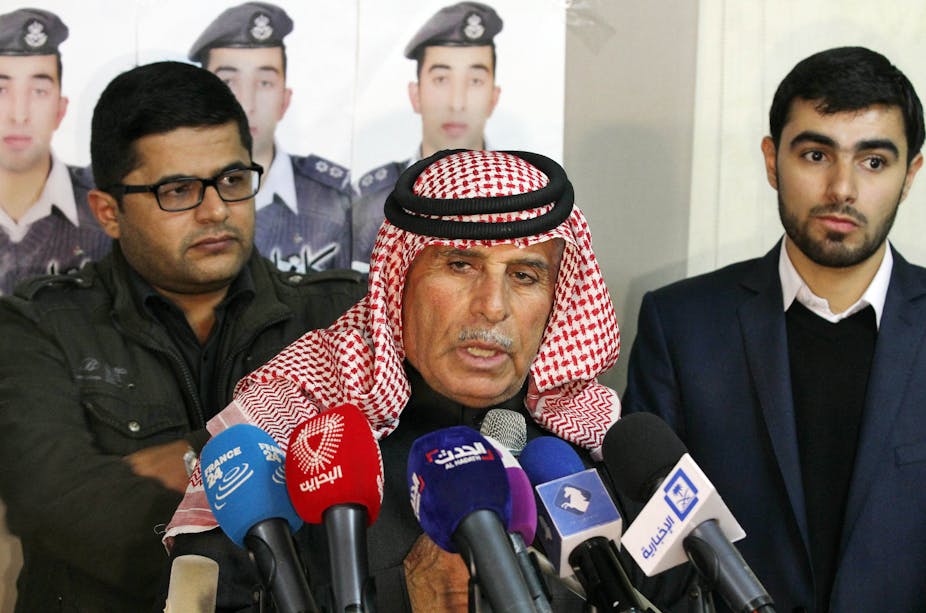The latest atrocity committed by Islamic State – the burning to death of a captured Jordanian pilot – has dutifully been relayed to us in gory detail, with part of the media coming across as little more than a PR wing of the terrorists.
While many outlets seemed to have bowed to concerns about giving IS the oxygen of publicity and toned down their coverage of beheadings, for some that went out the window as soon as a new angle came along.
Some will focus on Fox News’s decision to screen these horrors. But others, such as Piers Morgan in the Daily Mail, have invited their readers to watch and imagine what it must have been like to be there.

Terror depends, almost entirely, on the response of the host society. As IS suffers steady setbacks in its chosen battle grounds – variously from Kurdish resistance fighters and others engaged by the coalition of the unwilling-to-go-there-themselves – it must be relieved to still be gaining ground somewhere.
The home front
World leaders are right to decry this latest murder as reflecting how barbaric the group is. And while it is obviously a concern that IS is completely unanchored and unaccountable to any moral constituency, it may also be time for us to focus more on the challenges at home.
The visual and descriptive gore-fest presented by the media appeals – possibly unconsciously – to a significant voyeuristic streak within contemporary society. Members of the public are now so removed and disengaged from political discourse and action today that they think little of simply watching such events go by.
The response acts as an invitation to the terrorists to do more – to reach for even greater depths of depravity. Without their media impact the group would simply be a band of extremists being wiped out in the Middle East. At the same time the latest call by British MPs to do more to fight them there comes across as simply another evasion of any problems back home in the UK.
Home secretary Theresa May is busy introducing the seventh piece of counter-terrorism legislation since 9/11. It mandates local authorities, schools, colleges and universities to do more to help identify and eradicate radicalisation in their midst. It also reflects a complete confusion as to what this might mean. It is there “to be seen” to be doing something.
Dutifully, the various bodies mandated to perform these tasks will, in their turn, introduce new measures they mostly do not believe in to be seen to be in compliance with government diktat. In doing so, all sides help create a society of bad faith. No-one says what they think any more, and what they do say is designed to avoid conflict.
Little wonder then that, in such a society, so many – and particularly the young – are looking for something real to believe in. They certainly don’t get that from their leaders. Unsurprisingly, some are propelled to search for conviction online and a fraction of those will find it among bizarre and barbaric belief systems.
The government displays little understanding of this active search for belief and engagement. It continues to prefer to present a child-safety model of radicalisation, whereby the innocent are indoctrinated by jihadist groomers, thus pointing to a need to their avoiding being confronted with challenging or – in their parlance – extreme ideas.
What do we believe?
This might almost work if the authorities had any idea of what it was that they wanted people to be de-radicalised into. But successive establishments worldwide have shown themselves to be completely muddled and confused when it comes to identifying what they stand for. Clear, coherent values and beliefs appear too assertive for their tastes.
In our supposedly tolerant societies you can believe in anything you like and behave accordingly – as long as you do not believe in it too much or behave too extremely. But this is not so much tolerance as indifference. The Enlightenment view of tolerance was to engage ruthlessly with those you disagreed with – without killing them.
It is this that best reveals the inner moral bankruptcy of Western leaders today. And it is this that confirms why any solution will have to begin at home. In focusing on so-called “extremists” and “radicals” the authorities effectively reveal that they have given up on engaging with the content of such beliefs and merely target their extent.
With organising principles such as these no wonder we are in a rut. It is time we started articulating what it is we stand for rather than merely railing about what we are against. A good place to start would be to lambast our own media for their pornographic obsessions that effectively act as a stimulus to the idiots to do more.

